So, you’re creating fantastic web-based content for readers invested in your topic or industry. You want people to view your work, and your target audience is eager for the type of articles and blog posts you produce.
That’s great, right?
It is – if readers can find your website.
No matter how good your product is, if you don’t have search engine optimization (SEO) that boosts your Google rankings, you’ll never find the traction you’re looking for.
That’s where link building comes in.
Creating a solid network with reputable sites through link building lends credibility to your website. This will help you hurdle past the pesky
And if you’re new to this, don’t worry! In this blog post, I’m highlighting everything a beginner needs to know about link building.
By the time you’ve finished this post, you will know:
- What link building is
- Why it boosts
SEO - How you can use link building to your advantage.
Let’s get started!
So, What Exactly Is Link Building?
Link building is centered around getting other websites to link back to your website.
This can be done through various methods, but the end goal is connecting to reputable pages and increasing your link portfolio.
Link building has many benefits, and when it is done correctly, it’s a win-win situation. You get a link from another website that tells the search engines your content is credible, and the link to your site will, in turn, boost the link portfolio of the other website.
Link building is an essential part of any successful
The key is making sure you are working with excellent websites.
Low-quality link building can damage your site, so it’s essential to always focus on getting high-quality links from established websites with a reputation for accuracy and clarity. We want to add to your credibility, not detract from it. An easy way to do this is use professional link building services.
But let’s back up a bit. Before we get link building, we need a solid understanding of what links – or hyperlinks – are and how you can optimize them to enhance your link building strategy.
What is a Hyperlink?
A hyperlink, also called a link or web link, is a clickable link that takes users from one web page to another.
They appear in the text and are often underlined or given different colors to make them stand out from non-linked content. These links can be found embedded in:
- Text
- Images
- Audio
- Video
Hyperlinks are the foundation that connects websites, and they have been around since the dawn of the internet. They are created using HTML code snippets, and their purpose is to allow users to quickly and easily navigate through related information on the web.
Hyperlinks can be broken down into five parts:
- Start of link tag
- Attribute
- Destination URL
- Anchor text
- Closure of link tag
Start of Link Tag
A link tag in HTML looks like this:
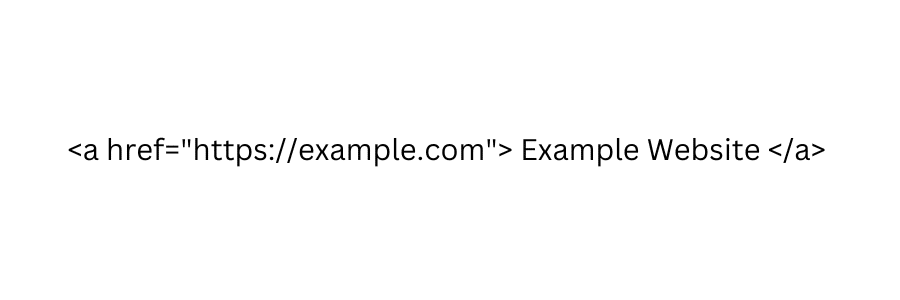
The start of a link tag is the opening part of the link; it tells the browser that a hyperlink should be created.
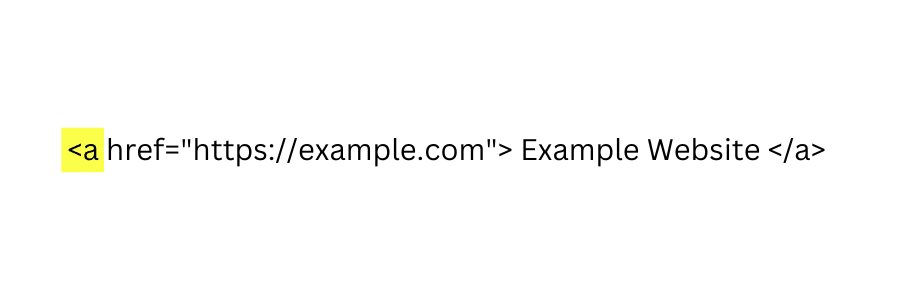
Attribute
The href attribute stands for “hypertext reference.” It is the part of the link tag that tells search engines where you want the user to be taken.
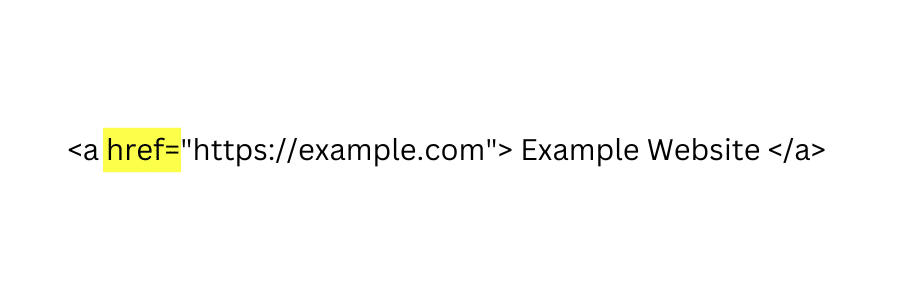
Destination URL
The destination URL is the address of the unique webpage that your customers will land on after clicking through from your website.
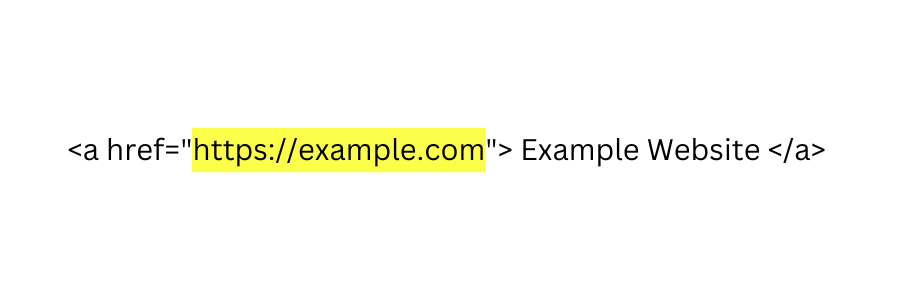
The wording of the destination URL is important because it is assessed for
Anchor Text
The anchor text is what users and search engines see when links are embedded in a post’s text.
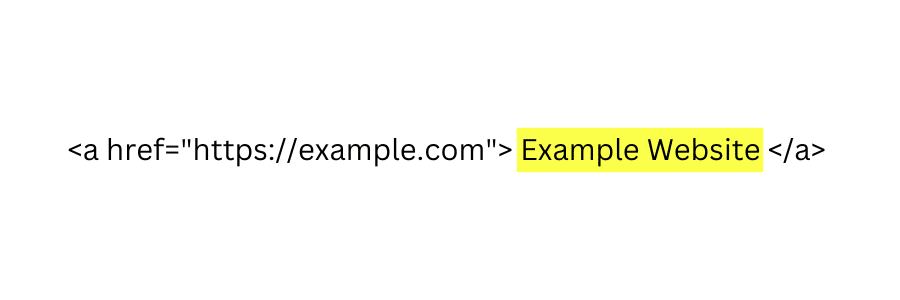
Here are some things to keep in mind about your anchor text:
- Like the destination URL, it’s a major part of
SEO
- It helps readers easily navigate the sources you’ve decided to include in your content.
- The anchor text is integral to link building because it gives the link context and helps signal to search engines what the page is about.
- Your anchor text must be strategic.
For example, if you wanted an article on your website to rank for the keyword “link building,” you would need to include that exact keyword in your anchor text.
This helps search engines understand what your page is about and allows them to understand the relevance of your link and, ultimately, your web pages.
Closure of Link Tag
The last part of the link tag is the closure.
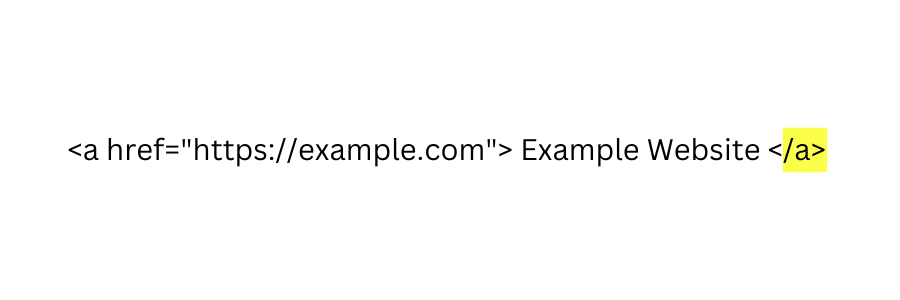
This tells search engines that the link tag is finished, and any other text or code that follows it will be ignored.
Now that we have a basic understanding of how hyperlinks are created and how they relate to
Why Do Search Engines Care About Links?

Search engines care about links because they are a crucial part of their algorithms for determining the value of a website and the priority of its SERPs ranking.
You’re competing against endless other websites for these rankings, and the links to your website from higher-ranked pages can help you gain traction.
The more quality, relevant links you have pointing to your website, the higher likelihood that search engines will recognize you as a source that should be prioritized.
How Does Link Building Improve Search Rankings?
Link building is an effective way to increase a website’s rankings in search engine result pages for several reasons:
- High-quality links help search engine algorithms understand a website’s relevance and authority.
- Websites are seen as more credible and reliable sources when they link to each other.
- Search engines take link building into account. The more quality links you have pointing to your website, the better your chances of ranking higher in the search engine results pages.
- Link building increases website visibility, which helps increase traffic to your site.
How Can Link Building Benefit Your Business?
Link building can offer a number of key benefits to your business, including improved visibility and
By building quality external links to other websites and blogs, your business can gain greater visibility in search engine rankings, allowing more people to discover your website.
This can help drive more organic traffic and bring potential customers who are already interested in your product or services.
Ultimately, link building helps to create a more diverse backlink profile, which is essential for
When link building is done well, you can expect tangible growth in your:
- Referral traffic
- Brand building
- Relationship building
Referral Traffic
Referral traffic is an important source of website visits! It occurs when visitors arrive at your website from another site, often through a link.
This type of traffic can be extremely valuable as visitors who arrive from external websites are often more engaged and may stay longer on your website.
And when visitors share your website content on their social media platforms or other websites, they can direct even more referral traffic.
To maximize the benefits of referral traffic, it’s critical to monitor and analyze the data to see which external sites are driving the most visitors.
Brand Building
Another critical benefit of link building is the extension of brand building.
When websites link to your content, it helps to boost your credibility and establishes you as an authoritative source in your field. It also helps build customer trust and loyalty, leading to more conversions and long-term partnerships.
When link building helps to create a more positive brand image, it can help attract new customers and keep them coming back. The more websites that link to your content, the more chances you have of being seen as an expert in your industry.
Relationship Building
Link building is also an opportunity for relationship building.
But it’s more than an opportunity – if you don’t build good relationships with a network of reputable websites, you are stuck with a significant hole in your strategy.
Establishing trust with other websites and content creators is essential to getting quality links.
If you don’t develop good sources, you won’t be able to rely on them to backlink to your website. Finding mutually beneficial link building relationships ensures that you aren’t simply posting great links but also getting your site backlinked.
So, we’ve established what links are and the importance of link building strategies when it comes to search results.
But how do we make sure our links are optimized for link building and, ultimately,
Use keywords in your links and anchor text!
How to Find Keywords for Link Building
Keywords are terms or phrases closely related to your website’s content, and they help search engines determine where your site should be ranked in their results.
With the right keywords built into your links through the destination URL and anchor text, you can increase your visibility and attract more potential customers to your website.
So, how do you identify the keywords that will drive your content up in the search engine rankings?
Here are some of your best options:
*Pro Tip: You can use a keyword tracking tool to find and track keywords in your niche.
Audit Your Website
If you’re looking to boost your website’s search engine ranking, auditing your website for keywords is one of your most essential strategies.
You need to find the words and phrases that best define your site’s content so that search engines like Google can easily find and index your pages.
Auditing your website is not a difficult task and can be done in just a few short steps:
- Identify the keywords that are important to your business and the topics your website covers.
- Use Google Search Console to find out which search terms people are already using to find your website.
- Create a list of those terms, then see what highly searched terms best align with the site and the content you want to promote.
- Incorporate that keyword(s) into your URL destination and anchor texts.
Checkout Competitors
Researching the competition can be a great way to identify keywords you may not have thought of when creating your content strategy.
Take some time to look at what your competitors are doing and the keywords they’re using to discover topics you haven’t thought of yet.
It’s a great way to brainstorm new ideas and expand your content strategy.
You don’t want to copy what they’re doing, but you can use their strategies to inspire your content. Researching competitors is a fantastic way to learn about the latest trends and industry topics, so you’re always ahead of the game.
Use a Keyword Research Tool
Investing in a quality SEO tool can be the difference between success and failure.
With a keyword research tool, you can quickly identify profitable keywords that are most likely to bring you the most website traffic.
You can also monitor your rankings and track changes that occur in search engine algorithms over time.
These tools help you find out what keywords are trending and can help you optimize your website accordingly. With the right keyword research tool, you can identify the perfect keywords that will boost your strategies for building links.
Here are some popular keyword research tools:
- SEMrush
- Moz
- Ahrefs
- Keyword Tool
- Long Tail Pro
Each of these tools offers different features and services to help you maximize your keyword research.
1. SEMrush
SEMrush is excellent for digging into competitors’ websites to see what keywords they are using.
2. Moz
Moz allows you to audit your website and identify areas where you can improve.
3. Ahrefs
Ahrefs is excellent for tracking keyword trends.
4. Keyword Tool
Keyword Tool helps you find keywords related to your niche.
5. Long Tail Pro
Long Tail Pro helps you find long-tail keywords that are less competitive but highly targeted.
These are just a few of the options out there for support in keyword optimization. Finding the tool that best fits your needs empowers you to take your keyword development to the next level.
Once you’ve found the perfect keyword, it’s time to use them to support your link building strategies.
Link Building Strategies

So, we understand links, the way link building works, and we even have our keywords identified.
Now we’ve reached the point where we need to implement link building strategies that will help us build the relationships that lead to backlinks from quality sites.
So, how do we find these and build these important relationships?
We need to:
- Make a list of sites that would be ideal for link building
- Write great content that attracts link building partners
- Work on link building outreach
- Search for broken link building opportunities
Make a List of Sites
When making a list of sites for link building, focus on industry blogs, and other relevant sites that accept contributions, such as guest blogging.
People generally trust content published on authoritative websites more than random blogs, so look into sites that already have an established audience and are seen as a go-to source for industry news.
It is also essential to make sure that your content is complementary rather than in direct competition with your would-be link building partners.
The idea is to point traffic toward each other.
If you’re fighting for the same audience’s ear on the same topic as another website, you should steer clear from sending readers in their direction.
Write Great Content That Attracts Links
Once you find sites ideal for link building, it’s time to share content that will attract other link builders.
Focus on creating content that is interesting and relevant to your industry. This will make it easier for other link builders to see the value of linking to your content.
Make sure you are sharing information that truly enhances the conversation. Don’t simply regurgitate what other bloggers are saying; provide a unique perspective or original research that people won’t find elsewhere.
And while it is important to use keywords to build links and direct your anchor text, along with sprinkling them throughout the content you produce, you need to avoid spammy link building techniques like stuffing keywords into your content.
When they accurately reflect what you’re sharing, keywords are powerful tools! But only use them to boost content that accurately and insightfully shares ideas centered around the keywords.
Link Building Outreach
Start networking!
Once you have your list of websites identified, it’s time to start connecting with potential link building partners.
Reach out to website owners, editors, and other link builders with an email introducing your content, linking back to the post you’ve written, and inviting them to comment or share the content.
The key is to ensure you are engaging in genuine conversations and developing relationships with potential partners.
Show them where you can (and perhaps already have) provide value by linking to content from their site on yours with solid anchor text that highlights what they have to say.
If someone is open to a link building partnership, strategize together on mutually beneficial steps you can take to help drive more traffic to each other’s sites.
Once that dialogue is open, you may discover more ways to support each other with link building tactics than you ever imagined!
Broken Link Building
Don’t forget about broken link building – this is a great way to grab the attention of busy website owners and editors.
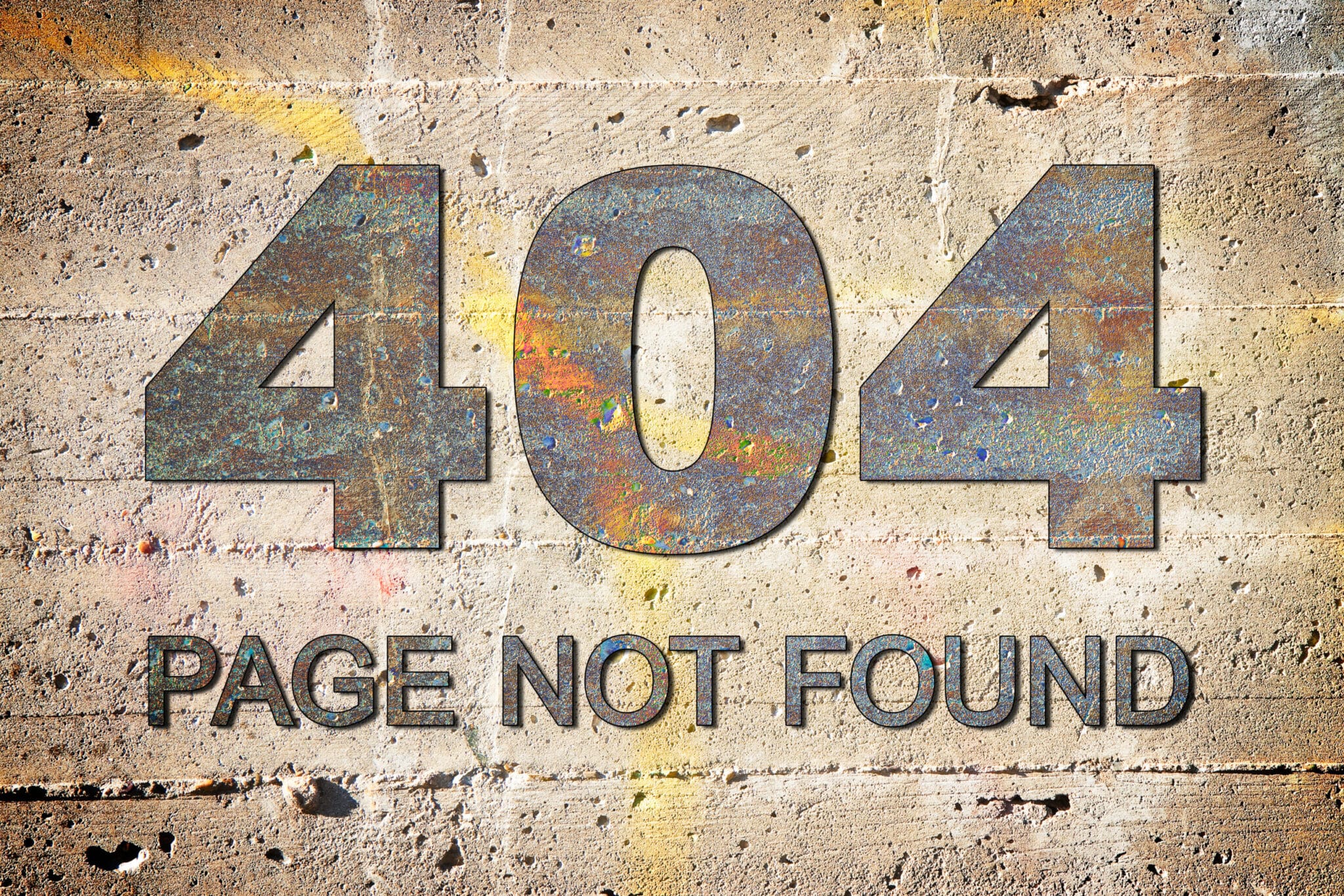
With this strategy, you hunt down broken links on relevant websites and then make suggestions for your own content as a replacement.
This demonstrates to the website owner that you have the same goal in mind: keeping their content up-to-date and helpful for readers. In exchange, you get great backlinks that can lead to more traffic for your own website.
This is low-hanging fruit in the world of link building.
Don’t pass up the opportunity to get some easily acquired backlinks with broken link building – it’s worth taking the time to reach out and build new relationships.
When you’re successful, the rewards can be ongoing.
As with any link building technique, you’ll have to do your research and invest time toward the goal. But once you find a broken link in your industry that you have the content to address, you have the chance to offer a great – and immediate – solution.
Link Building Metrics
While you now have a good idea of how to develop link building relationships, we’re now going to focus on deciding if a link is right for you.
Don’t get so caught up in link building relationships that you fail to assess if a link will benefit your website.
You can use link building metrics to evaluate the value of each link. Knowing which metrics to look at is crucial, as it can help you decide if a link is worth pursuing.
Some of the most important metrics to take into consideration are:
- Domain authority
- Page rank
- Number of links
- Relevance of website
Domain Authority
Domain Authority is a powerful metric used to measure the strength and trustworthiness of a website.
It helps marketers assess how well their website measures up against other sites in their industry.
This is particularly helpful for
When you assess domain authority, you can quickly identify potential link building partners that have a higher likelihood of providing the desired results.
PageRank
On the other hand, PageRank is a Google algorithm used to measure the quality and quantity of links pointing to a website.
It considers how many incoming links a website has and how trustworthy they are. The higher the page rank, the more likely a website appears in search engine results pages.
PageRank is an important factor for
Link building partners with a higher PageRank will likely have more authority and provide more value for
Number of Links
The number of links on a website can be used as another link building metric.
The more quality links pointing to a website, the higher its likelihood of being indexed by search engines.
The number of links can be used to determine the trustworthiness of a link building partner and assess how valuable they may be for your link building campaign.
Relevance of Website
The relevance of a website is also a critical metric for link building.
Relevant websites are more likely to attract visitors who are interested in your content.
These websites also tend to have higher authority and are more likely to provide value for
Relevant websites are usually found on the first page of search engine results, so they should be a priority for link building campaigns. They will also focus on topics related to your website – the connection needs to make sense.
Link Building Services
While it’s clear that link building is an excellent asset to your online presence, it can also be very time-consuming.
Thankfully, those who don’t have the time or interest in developing a link building strategy have another option.
Link building services are an effective way to increase your online presence and reach more potential customers without doing the digging yourself.
Through these services,
Link building service benefits:
- They are fast and efficient.
- A reputable firm will also have experience reaching out to potential partners, giving you a better chance of success.
- These professionals can identify and strengthen weak links within your business or industry, ensuring your website has the best chance to succeed.
Link building service negatives:
- They can be quite costly.
- The results are not always guaranteed.
- If you don’t have the right contacts and relationships in place, your link building efforts may fail despite their efforts.
- Link building services can be rigid in their approach, which won’t work for every organization.
Ultimately, do your research and consider the costs and benefits to determine if link building services are the right fit for your website. With some strategic planning, you’ll be able to make an informed decision on the best way to move forward.
Interested in finding out more about link building services? Check out our reviews on link building service industry leaders such as PosiRank, Rhino Rank, FATJOE, and The Upper Ranks.
Did We Forget Anything?
We hope you feel empowered to include link building in your
When you research, build relationships, and create great content, you are using the best link building strategies available to boost your website.
But did we forget anything? If you have questions or another link building tip to share, post it in the comments below!
Link Building Frequently Asked Questions
Link building is the process of acquiring backlinks from another web page that is directed to your content. To succeed, link building should focus on obtaining quality links from reputable websites relevant to your own.
A good strategy for building links will help to increase your website’s visibility by improving its rankings in search engine results pages.
An example of link building would be guest blogging. You create content for another website with a link to your own through your blog post or ask other sites to link to yours in exchange for content.
Link building can be divided into two main categories: off-page and on-page.
Off-Page link building involves activities like directory submission, blog commenting, and social bookmarking.
On-Page link building involves creating content with high-quality backlinks from other web pages, optimizing your website for search engines, and creating internal links to other pages on your own website.
Link building tools are used to help create, manage, and optimize backlinks.
They can be used to find link opportunities, measure link performance, and manage link building campaigns. They can also track backlinks, analyze competitor links, and build relationships with other website owners.
The best link building approach is to create high-quality content that offers real value to your readers.
When you produce content that other websites want to link to, it can help build your reputation as an authoritative source and increase your website’s
Link building is important for
Links from reputable websites can also help increase your website’s visibility and improve rankings in search results pages. Ultimately, link building is a key part of an effective
There are several ways to get more backlinks for your website. You can create quality content that other websites might want to link to, reach out to other websites and ask for backlinks, or use link building tools to find link opportunities.
It is also important to have a strong social media presence and engage with other websites to build relationships.
– Focus on creating high-quality content.
– Utilize link building tools to find and track backlinks.
– Reach out to other websites and ask for backlinks.
– Engage with other websites on social media.
– Monitor your link building campaigns and make adjustments as needed.
– Be patient – link building takes time to get results.
Link building carries some risks, such as getting penalized by search engines for using questionable tactics.
It is important to only engage in ethical link building practices, like creating high-quality content and building relationships with other websites. You should monitor your link building campaigns closely and make adjustments as needed.
You can track the success of your link building efforts by measuring metrics such as total backlinks, domain authority, and organic traffic.
You can also use link building tools to track the performance of your backlinks over time and analyze which ones are driving the most results.


